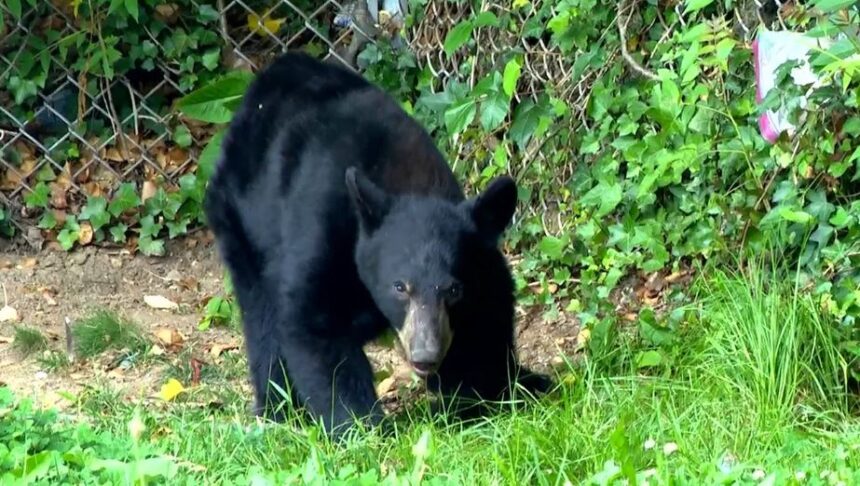N.C. Wildlife Commission offers tips to reduce human-bear interactions after Helene

The N.C. Wildlife Resources Commission is receiving reports of an increase in human-black bear interactions in Asheville and Buncombe County.
By Zola Sigmon
Click here for updates on this story
BUNCOMBE COUNTY, North Carolina (WLOS) — The N.C. Wildlife Resources Commission is receiving reports of an increase in human-black bear interactions in Asheville and Buncombe County, according to a release.
The release said impacts from Hurricane Helene on local government services and infrastructure are leading to increased opportunities for bears to find food due to the availability of trash, unattended donation drop-offs and rotting foods, particularly in damaged homes and businesses.
“We recognize the immense challenges facing Asheville and surrounding communities trying to recover from this unprecedented event and want to offer resources to help mitigate human-bear conflicts,” said theN.C. Wildlife Resources Commission in their release.
Below are the resources provided by theN.C. Wildlife Resources Commission to reduce the chance of human-bear contact:
Home Entry Advice: Keep windows and doors closed and latched if bears are observed in your area. If you are unable to secure the potential point of entry (e.g., doors or windows) due to damage, consider putting out anunwelcome mat made of plywood and nails.
Outdoor Refrigerator/Freezer Advice: If you have an outdoor refrigerator or freezer, consider installing a padlock on the door to keep bears from accessing the food. Some chest freezers come with pre-installed locks.
Secure Food, Garbage, and Recycling: Food and food odors attract bears, so don’t reward them with easily accessible food, liquids or garbage.
The release said both Buncombe County and the N.C. Wildlife Resources Commission recommends that residents make every effort to store garbage in a bear-resistant container or inside a secure enclosure, such as a shed, garage or home, until it can be picked up or brought to a collection site.
The release also said that residents are further encouraged not to place their trash or trash bags outside, such as in a carport, on their lawn or in an open garage, as bears will find it, scatter the garbage and be tempted to return to the home.
Additionally, if possible, the release said that residents should avoid leaving out unattended food donations. Those food donations are critically needed, but if left outside unattended, they will be scavenged by bears and other wildlife, according to the release.
Additionally, listed below are ways residents can implement these BearWise Basics:
Never Feed or Approach Bears: Intentionally feeding bears or allowing them to find anything that smells or tastes like food teaches bears to approach homes and people looking for more. There are plenty of natural foods (acorns) for bears right now, so please don’t feed them; they don’t need it.
As a Reminder:The City of Asheville and Buncombe County haveordinances restricting wildlife feeding.
Remove Bird Feeders When Bears are Active: Birdseed and grains have many calories, making them attractive to bears. Removing feeders is the best way to avoid creating conflicts with bears.
As a Reminder: Please refrain from putting out bird seeds or intentionally feeding wildlife. Our bird friends have lots of natural foods available to them.
Never Leave Pet Food Outdoors:Feed pets indoors when possible. If you must feed pets outside, feed them in single portions and remove food and bowls after feeding them—store pet food where bears can’t see or smell it.
Keep Dogs Leashed or Leave Them at Home: Letting dogs chase or bark at bears is asking for trouble; don’t force a bear to defend itself.
If you or someone you know needs to report concerning bear behavior and activity, please get in touch with the N.C. Wildlife Helpline at866-318-2401 or visit this website. The Wildlife Helpline receives calls from 8 a.m. to 5 p.m. Monday through Friday.
Please note: This content carries a strict local market embargo. If you share the same market as the contributor of this article, you may not use it on any platform.



